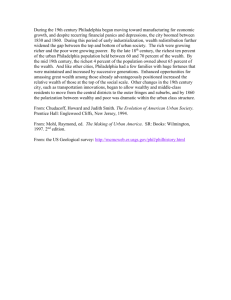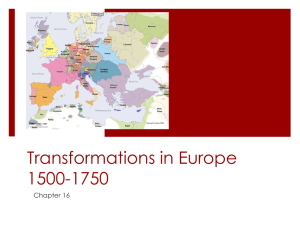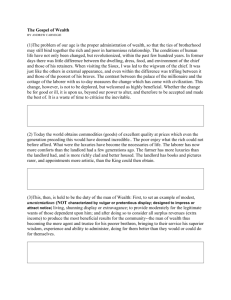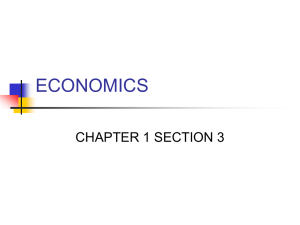Wealth Creation as Integrated with Faith: A Protestant Reflection
advertisement
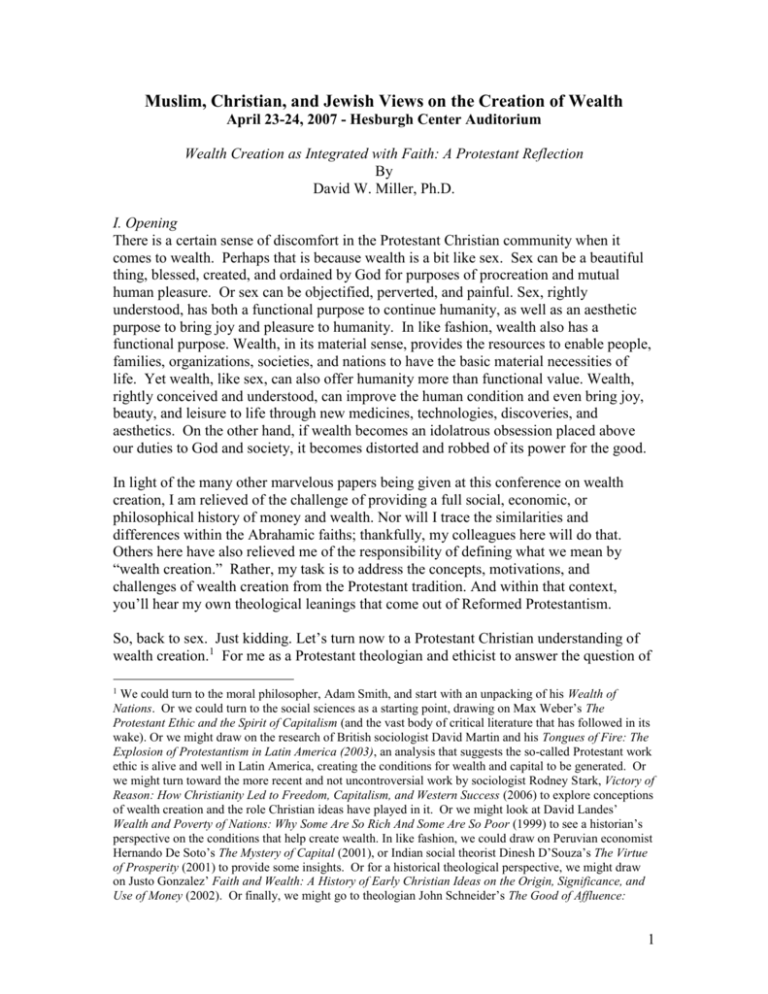
Muslim, Christian, and Jewish Views on the Creation of Wealth April 23-24, 2007 - Hesburgh Center Auditorium Wealth Creation as Integrated with Faith: A Protestant Reflection By David W. Miller, Ph.D. I. Opening There is a certain sense of discomfort in the Protestant Christian community when it comes to wealth. Perhaps that is because wealth is a bit like sex. Sex can be a beautiful thing, blessed, created, and ordained by God for purposes of procreation and mutual human pleasure. Or sex can be objectified, perverted, and painful. Sex, rightly understood, has both a functional purpose to continue humanity, as well as an aesthetic purpose to bring joy and pleasure to humanity. In like fashion, wealth also has a functional purpose. Wealth, in its material sense, provides the resources to enable people, families, organizations, societies, and nations to have the basic material necessities of life. Yet wealth, like sex, can also offer humanity more than functional value. Wealth, rightly conceived and understood, can improve the human condition and even bring joy, beauty, and leisure to life through new medicines, technologies, discoveries, and aesthetics. On the other hand, if wealth becomes an idolatrous obsession placed above our duties to God and society, it becomes distorted and robbed of its power for the good. In light of the many other marvelous papers being given at this conference on wealth creation, I am relieved of the challenge of providing a full social, economic, or philosophical history of money and wealth. Nor will I trace the similarities and differences within the Abrahamic faiths; thankfully, my colleagues here will do that. Others here have also relieved me of the responsibility of defining what we mean by “wealth creation.” Rather, my task is to address the concepts, motivations, and challenges of wealth creation from the Protestant tradition. And within that context, you’ll hear my own theological leanings that come out of Reformed Protestantism. So, back to sex. Just kidding. Let’s turn now to a Protestant Christian understanding of wealth creation.1 For me as a Protestant theologian and ethicist to answer the question of 1 We could turn to the moral philosopher, Adam Smith, and start with an unpacking of his Wealth of Nations. Or we could turn to the social sciences as a starting point, drawing on Max Weber’s The Protestant Ethic and the Spirit of Capitalism (and the vast body of critical literature that has followed in its wake). Or we might draw on the research of British sociologist David Martin and his Tongues of Fire: The Explosion of Protestantism in Latin America (2003), an analysis that suggests the so-called Protestant work ethic is alive and well in Latin America, creating the conditions for wealth and capital to be generated. Or we might turn toward the more recent and not uncontroversial work by sociologist Rodney Stark, Victory of Reason: How Christianity Led to Freedom, Capitalism, and Western Success (2006) to explore conceptions of wealth creation and the role Christian ideas have played in it. Or we might look at David Landes’ Wealth and Poverty of Nations: Why Some Are So Rich And Some Are So Poor (1999) to see a historian’s perspective on the conditions that help create wealth. In like fashion, we could draw on Peruvian economist Hernando De Soto’s The Mystery of Capital (2001), or Indian social theorist Dinesh D’Souza’s The Virtue of Prosperity (2001) to provide some insights. Or for a historical theological perspective, we might draw on Justo Gonzalez’ Faith and Wealth: A History of Early Christian Ideas on the Origin, Significance, and Use of Money (2002). Or finally, we might go to theologian John Schneider’s The Good of Affluence: 1 wealth creation I must first turn to scripture. Protestants place hermeneutical primacy on sola scriptura. We undertake the hermeneutical task as individuals and in community. We are part of a theological and ecclesiastical history that honors creeds and confessions but also draws on reason and experience. And we rely on illumination from the Holy Spirit to interpret scripture for our time and place. As a Protestant theologian and ethicist, I observe certain tensions within my own tradition about wealth creation. These tensions and mixed voices have their roots in both testaments of the Christian Bible. There is one strand of God’s voice that describes wealth as a blessing, a blessing that God wants to shower upon us with abundance. There is another voice that describes wealth as an obstacle to faith, and a danger. There are yet other strands of biblical teaching that understand wealth in a material sense, and there are other writers and passages in the Bible that want to spiritualize wealth. So who is right? What is the Protestant voice if it is to be grounded foremost in scripture, and scripture seems multivocal on the topic? And how does that impact the conceptions, motivations, and challenges of wealth creation as a backdrop to other questions of corporate social responsibility, wealth creation, and maximizing shareholder return? II. Wealth Creation as Offense, an Obstacle, or an Outcome of Faith To explore these questions, I have created a three-part rubric that exposes three prevalent yet insufficient Protestant attitudes toward wealth creation. I will also be so bold as to conclude with a modest sketch of a proposed theology of wealth creation that attempts to address and transcend the strengths, weaknesses, and tensions found in the three traditional models. I call that proposal Wealth Creation as Integrated with Faith. Let us now begin by exploring the three prevalent Protestant modalities where wealth creation is: 1) an Offense to Faith; 2) an Obstacle to Faith; or 3) an Outcome of Faith. 1. Wealth Creation as an Offense to Faith This tradition where wealth and wealth creation are offensive to faith has historically been a vocal minority in Protestantism. This is the theological view that sides with the third century Manicheans who saw the material and the spiritual world in irreconcilable opposition.2 There is a rich tradition (pun intended) in Christian history dating back to biblical times that frames material wealth as an offense to faith. True believers felt they needed to renounce all material and worldly pleasures to follow Jesus (“Take nothing for the journey except a staff—no bread, no bag, no money in your belts. Wear sandals but not an extra tunic” (Mark 6:8-9); “Foxes have holes and birds of the air have nests, but the Son of Man has no place to lay his head.” (Matt. 8:20); etc). If Jesus rejected material things, so the argument goes, shouldn’t we also as part of the imitation of Christ? This theological accent can lead to pejorative views toward material wealth. We see this in the early Desert Fathers, the later mystics, the monastics, and some Catholic orders that Seeking God in a Culture of Wealth (2002) to see if wealth can have redemptive purposes for God’s existing and coming Kingdom, and not merely be a stumbling block to faith, a force of oppression, and source of misused power. 2 The Manicheans saw the world in dualistic terms, and viewed materiality as offensive to faith, part of a titanic battle between good and evil. This theology that defines wealth in material terms and places it over and against spirituality, as an offense to true believers, unwittingly perhaps, shapes some Protestant attitudes to corporations and wealth creation as being intrinsically and irredeemably fallen. 2 swore a vow of poverty while others withdrew from the world. There are indeed strands of Franciscan thought still operative in many Protestant theologies today that view the renouncement of material possessions and vows of poverty as virtues. If spirituality is valorized in the hierarchy of Christian virtues, and such spirituality is manifested in a renunciation of material comforts and things, it only stands to reason that wealth and wealth creation could be seen as offensive to faith.3 We see this tension in the two Gospel accounts of Jesus’ teachings on the Beatitudes where Jesus offers a word of blessing and eschatological hope to the poor and those in dire situations. Matthew seems to spiritualize Jesus’ pronouncements, whereas Luke seems to suggest that Jesus meant them more literally. For instance, Matthew writes, “Blessed are the poor in spirit, for theirs is the kingdom of heaven.” (Matt. 5:3) In contrast, Luke records Jesus’ words with a more literal or material meaning, “Blessed are you who are poor, for yours is the kingdom of God. Blessed are you who hunger now, for you will be satisfied.” (Luke 6:20-21) And unique to the Lukan account, as if to ensure the listeners did not miss the point of eschatological reversal, Jesus also speaks to the “haves” of society, saying "But woe to you who are rich, for you have already received your comfort. Woe to you who are well fed now, for you will go hungry.” (Luke 6:24-25)4 This view of wealth and wealth creation as an offense to faith can still be found in some corners of Protestant Christian theology today. Some adherents to this view are heirs of mid-20th century Christian Socialism movement, and others are disciples of later 20th century Liberation theology teachings. In addition to espousing a preferential option for the poor, many liberation theologians also have an operative if not specifically articulated “preferential condemnation of the wealthy” and the marketplace systems that help create wealth. These theologies raise important and valid questions of social and economic justice, yet they often misunderstand economic matters and bring an imbalanced theology to the topic of wealth creation. The outcome of this flawed modality of wealth creation as offense to faith is a tendency to reject the co-creative and constructive role business corporations can play in addressing society’s material problems. 2. Wealth Creation as an Obstacle to Faith This tradition where wealth creation is an obstacle to faith finds itself solidly grounded 3 Some would suggest that this Christian debate is simply an ongoing replay of the old Hellenistic versus Hebraic attitudes to materiality. Greek philosophers, of course, view thinking and reflection as the highest order virtue, while viewing techne and the creating of life’s material necessities (i.e. wealth) as a lower order virtue and social status. To the Greeks, wealth creation was a necessary evil, if you will, undertaken by the lower classes of society, the slaves and subordinates. 4 Other passages in the New Testament exist where one might interpret that the righteousness of Christ and the justice for which he stood is offended by wealth. For instance, Jesus condemns the one who hoards and builds bigger barns to store up riches for himself “but is not rich toward God” (Luke 12:21). In another example, some of Jesus’ disciples criticize Mary for anointing Jesus with expensive perfume (Mark 14:4-6). 3 and substantiated in scripture, as well as human experience. A logical biblical starting point is the first commandment, “You shall have no other gods before me.” (Ex. 20:3) One can rightly interpret these “other gods” as Calvin and many others do to mean competing deities, figures, or religions. Luther went further noting that this commandment is also is meant for those who trust in other gods such as, “great learning, wisdom, power, prestige, family, and honor.” (Larger Catechism, p.366) Luther explicitly addresses that which human experience also teaches us: we worship and create many forms of false gods and idols. And of these many false gods, Luther concludes that mammon is, “the most common idol on earth.” (Larger Catechism, p365). One could argue that the Reformers were simply following Jesus’ teaching on the same commandment. A paradigmatic example of this is Jesus’ encounter with the rich ruler (Mark 10:17-31). Jesus’ message was not that the ruler’s wealth per se was the theological problem, as some suggest. Rather, the rich man’s downfall was his attachment to and reluctance to let go of his wealth, thus failing to put his utmost faith in and reliance on Jesus Christ. His wealth had become his first god before God. Jesus addresses this same point in another parable noting, “No servant can serve two masters. Either he will hate the one and love the other, or he will be devoted to the one and despise the other. You cannot serve both God and money.” (Luke 16:13).” The Greek word translated as “money” is mammon. Mammon is frequently translated as money, wealth, or riches and usually carries a pejorative inference. The Greek word mammon (mam n s) actually comes from the Aramaic word m mon . A more literal translation of the Aramaic word mammon is that in which you place your trust. So Jesus was again teaching that we are to put our primary and ultimate trust in God, and not in our wealth, intelligence, skills, or other human assets. Jesus’ message is consistent with Proverbs 3:5 “Trust in the Lord with all your heart and lean not on your own understanding.” Jesus is concerned that sin will be an obstacle to faith and righteous living. For many, that sin is covetousness of material things and wealth. In dramatic fashion Jesus reminds listeners that whatever the sin, if it is an obstacle to faith, you must remove it from your life. “If your hand causes you to sin, cut it off. It is better for you to enter life maimed than with two hands to go into hell, where the fire never goes out.” (Mark 9:42-49). Our relationship with wealth and wealth creation can become an obstacle to faith. In similar fashion, Timothy continues this theological message that wealth per se is not the issue. Rather it is our motivation toward and our relationship with wealth that matters. Speaking to motivation and challenges, Timothy observes, “People who want to get rich fall into temptation and a trap and into many foolish and harmful desires that plunge men into ruin and destruction.” (1 Tim 6:9). Often misquoted by Christians and nonChristians alike, Timothy then observes that “the love of money is the root of all evil.” (1 Tim 6:10) It is the love of money that is the obstacle to faith, not the money itself. These biblical warnings were taken seriously by the early Reformers and continue to be so taken by many in the Protestant church today. We see, however, a tension in today’s church. On the one hand, this Protestant modality recognizes a theologically legitimate role for wealth creation and its subsequent use. On the other hand, there is a profound awareness of two ways in which wealth creation becomes an obstacle to faith. First, the 4 means through which we create wealth cannot be unjust. And second, having created wealth in righteous ways, we risk becoming seduced by its power and we gradually come to rely on it more than God. Those who accent wealth as an obstacle often choose not to engage in the business world, preferring instead engagement in the so-called caring professions or other forms of social work that allows them to ignore or sidestep the issue of generating jobs, goods and services, and surplus wealth for society. 3. Wealth Creation as an Outcome of Faith The Protestant tradition that views wealth creation as an outcome of faith also has a rich history. Though recent scholarship has been critical of Max Weber’s methodology and findings, there remains a strong Protestant theological strand that views wealth creation and material success as a direct result of faithful and sober living. Weber and others have suggested that ascetic Protestantism was the dominant form preached by the Puritan and Calvinist influenced communities during America’s colonial days and early life as a nation. This form of Protestant theology argued that the pursuit of wealth was not only acceptable but was almost a religious duty, as part of the Protestant doctrine of calling. Some held that receipt of material success was itself a sign of God’s providence and being part of the elect. In this Calvinist interpretation, hard work and frugal lifestyles were not just a means to an ends, but they were a spiritual act in themselves. This impulse, or Protestant ethic as Weber called it, coupled with new industrial technologies, rationalization, and specialization of tasks became the spirit of capitalism, and was one of the contributing factors that led to unimaginable wealth creation. Later Protestants went even further than Luther and Calvin regarding the objectives of hard work. John Wesley, the peripatetic preacher and founder of the Methodist Church, was unabashed in his support of wealth creation. However, to avoid the theological problems noted in the section on wealth creation as an obstacle to faith, he proposes a system of internal checks and controls. In his famous sermon, “The Use of Money” (reportedly preached dozens of times by him) he argues that people should earn all they can, save all they can, and give away all they can. We would not do justice to this mode of Protestant theology on wealth creation as an outcome of faith if I did not comment on the so-called “prosperity Gospel” preachers. Unlike Wesley who retained a social conscience, there are modern preachers and writers who teach that God unequivocally promised us wealth and abundance, so long as we believe in him and follow his laws. Some of the contemporary “name it and claim it” preachers are Creflo Dollar, James Bryant, Joel Osteen, and Joyce Meyer. Though the names of these prosperity gospel preachers and writers may change over the decades, the theology remains the same. Skillfully weaving selective verses from the Bible that promise material blessings to the obedient and the chosen, these preachers (and the occasional hustler) develop a warped theology of wealth entitlement. Crossing racial boundaries, the prosperity gospel preachers tend to come out of the Pentecostal, charismatic, and “spirit-led” traditions, though a growing number of evangelical churches have become enamored with the phenomenon. Best-selling books such as the Prayer of Jabez (2001) suggest a proven way for God to “bless me and enlarge my territory” (1 Chronicles 4:10). Even Time magazine took notice with a cover story last year on this 5 phenomenon with the title, “Does God Want You to Be Rich?” (September 18, 2006). This is a seriously flawed and dangerous conception and motivation of wealth creation as an outcome of faith. III. Wealth Creation as Integrated with Faith Is there a way out of these three limited and limiting ways of thinking about wealth creation? As Protestants, are we forced to whipsaw between imbalanced and incomplete theologies of wealth creation? While there are elements of theological accuracy in viewing wealth creation through the lens of these three traditions – as an offense, as an obstacle, and as an outcome of faith – in isolation and taken to the extreme each ultimately present distorted perspectives. To remedy that, I propose a more balanced theological mode I call wealth creation as integrated with faith. A healthy starting place to consider wealth and wealth creation is the doctrine of creation. The opening lines of Genesis reveal that the God of Abraham is a creator God, and that all that he has created is good. Genesis also teaches us that humanity was created in God’s image, which among other things implies a stewardship role to continue God’s good work, to tend the garden as trustees, and to act as co-creators with God. Genesis makes clear that this will take work; the garden will not tend itself and magically grow. Someone has to plant, sew, fertilize, pull weeds, fight off pests, harvest, and distribute the crops. It will take hard work, sweat, and labor to tame the earth and provide for humanity’s needs. But never in the creation narratives is the material world portrayed as over and against the spiritual world. In contrast, it is an integrated model where the secular is the arena for the sacred. Central to Reformed Protestant teachings to engage in the world, to heal that which is broken, to mend that which can be fixed, and to innovate and multiply our God-given resources. Indeed, as the name Reformed theology implies, one of the main tasks of Protestant Christians is to reform and transform the world in the image of God. This work is done not just to provide for our own needs but to honor God and serve neighbor. However, not all people have the capacity or capability to create wealth. Some live in such poor circumstances it is an accomplishment merely to subsist. But for those who do have the special capacity and capability to generate goods and services, they also have a commensurate responsibility to consider how this can be done in service of others. Wealth creation as integrated with faith teaches that those so gifted have an additional theological duty towards others. Older models, such as Wesley’s “The Use of Money” would accent charity. Our models today include but go beyond charity, to stress the transfer of means and methods for others to gain capacity and capability to generate their own wealth. We see this through theologically motivated micro-lending organizations such as US-based Opportunity International, the Guardian Bank in Bangalore, and the Grameen Bank in Bangladesh. These and other innovative integrated models of wealth creation leverage the generative power of the marketplace yet locate it within a theological context that calls us to serve others and not just ourselves. Another core teaching of Protestantism that sheds light on this question of wealth 6 creation is the doctrine of vocation, which holds that all baptized Christians have a calling. First, we have a general calling of discipleship to follow Jesus Christ as Lord and Savior. Second, God gives us specific callings or tasks throughout our life that we are to follow. Moreover, the Protestant conception of vocatio is that so-called secular callings are every bit as holy as those given to priests and monks. Daily work, whether mundane or stimulating, can be imbued with sacred purposes as a way to honor God and serve neighbor. If taken seriously, such attitudes toward work bring the fruits of integrity, excellence, industriousness, quality, creativity, pride, and productivity. Wealth creation may not always be the primary telos, but it often is a result. Jesus has a practical as well as a sacred view of material things and the importance of wealth creation. While Jesus has harsh words for those who gain their wealth by unjust means or who misuse their wealth for their own luxuries while ignoring the poor, he has equally harsh words for those who do not engage in productive stewardship. The parable of the talents (recorded by both Matthew and Luke) contains the well-known story of three servants who were each given certain sums of money to take care of while the master goes away. Two of the servants invest the money and make handsome returns. The third servant simply buries the money and returns the depreciated original capital back to the master. The first two servants are roundly congratulated, promised even more, and invited to come join in the master’s happiness. In contrast, the master is furious with the third servant for his poor stewardship of the talents given him. The master calls him “wicked and lazy,” takes away the money given to him, and redistributes it to the first two servants. The master chides the third servant saying he should have at least put the money on deposit with the bankers to earn some interest. The master’s final judgment is stinging: “And throw that worthless servant outside, into the darkness, where there will be weeping and gnashing of teeth.” (Matt. 25:30) Jesus sends an unequivocal message to those entrusted with material gifts: we are expected to be faithful stewards who return more than we were given. Jesus expects us to generate an ROI (return on investment). Jesus is very interested in money as a matter closely related to wealth and wealth creation. It shocks many to learn that Jesus spoke of money more than love or prayer. Was he the forerunner to today’s prosperity Gospel preachers? Hardly, but neither was he condemnatory of money per se. He understood the addictive and perverting aspects of mammon – i.e. false gods; other idols in which we place our trust – and he understood the intrinsic value of material goods rightly used. Jesus came to reorder our priorities, and wealth creation understood from the world’s perspective as benefiting the owner, is now to be understood as part of God’s redemptive plan, for the benefit of the world. He commands us “to do good, to be rich in good deeds.” (1 Tim 6:17-19) To Jesus, money, capital, and wealth generation have functional dimensions (allowing people to eat and have shelter), aesthetic benefits (allowing people to celebrate life and enjoy beauty), and a relational nature (where material items are used for self and neighbor). IV. Conclusion I have sought to give a brief outline of the Protestant conceptions, motivations, and challenges of wealth creation. The three flawed theologies we have addressed seem to have one commonality: they all have a “worldly” view of wealth. They all see wealth 7 from a human, not a godly point of view. Wealth creation as an offense, an obstacle, or as an outcome of faith all distort God’s view. In contrast, wealth creation as integrated with faith shows a balanced Protestant vision from God’s perspective. Considering wealth as integrated with faith allows for the partial wisdom of the other three models, while avoiding their flaws and extremes. Wealth creation as integrated with faith also reminds us to use ethical means to generate wealth and that the ultimate telos of our labors is to honor God and serve neighbor. As such, wealth creation is no longer an “end goal” in its own right but it becomes a “means goal” to help accomplish God’s purposes. Wealth creation as integrated with faith allows us to focus on holy and healthy means of providing for humanity’s basic needs, making advancements in food and medicine, and enjoying life’s aesthetic pleasures. Scripture reminds us that being a follower of Jesus means serving others. And for those with the capacity and capability to create wealth and help others do the same, they have a heightened responsibility. As Jesus expressed it, “From everyone who has been given much, much will be demanded; and from the one who has been entrusted with much, much more will be asked.” (Luke 12:48) If wealth creation is conceived and lived as integrated with faith, we might have a foretaste of the coming kingdom of God and its eschatological vision of a land of milk and honey, where justice flows like rivers. 8




